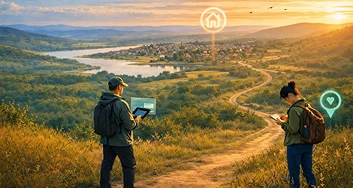Rhodes, an idyllic Greek island, welcomes 2.5 million tourists, making it among the most popular Mediterranean destinations. While tourism fuels the local economy, it also presents significant challenges. Cheryl Novak, Sustainability Expert at the Rhodes Co-Lab Sustainable Destination, emphasised the need for a comprehensive master plan encompassing the entire tourism experience.
To achieve sustainability, Rhodes requires a detailed transition mechanism. Cheryl pointed out that the United Nations Sustainable Development Goals, due to be achieved by 2030, need actionable steps to bridge the gap between current practices and future aspirations. These steps involve digital transformation, building a blue digital economy and green transition strategies. A robust stakeholder engagement framework is also crucial to ensure comprehensive and inclusive planning.
The Rhodes Co-Lab Initiative
The Rhodes Co-Lab is a public-private partnership involving the South Aegean region, TUI, the TUI Care Foundation and the municipality of Rhodes, with advisory support from PwC. The initiative aims not only to transform Rhodes, but also to create a replicable model for other islands in Greece and beyond.
Initially set to launch in the summer of 2023, the project faced an unexpected climate-related setback, prompting a re-evaluation of plans to incorporate resilience. This experience emphasised the urgent need to address climate change impacts more rapidly. The wildfires on Rhodes underlined the importance of system redundancy. In response to this event, The Rhodes Co-Lab has prioritised measures to protect the health and safety of visitors by updating the emergency response plan and by organising voluntary assistance in emergency situations.
A Holistic Blueprint for Transformation
The Rhodes Co-Lab project tackles challenges head-on with a multi-pronged approach, including thought leaders, strategic partners from different industries and local businesses. Cheryl explained that an extensive stakeholder engagement framework was developed after a year-long process, ensuring everyone from hoteliers to tour guides is on board with the destination's transformation. This collaborative spirit fosters a culture of innovation and shared responsibility for a sustainable future. The stakeholder engagement framework also incorporates a monitoring mechanism to track progress and ensure effectiveness.
The Rhodes Co-Lab initiative is centred on three pillars:
- Regeneration of the Natural Environment: Achieving climate neutrality by 2030 is paramount. The Rhodes Co-Lab enables the transition to a low carbon economy, climate neutrality and waste reduction strategies, drawing inspiration from pilot projects on other islands, such as 'Just Go Zero' on Tilos and public transport electrification projects on Astipalia and Halki.
- Strengthening Social Development and Cultural Heritage: The Rhodes Co-Lab initiative aims to improve the quality of life for residents, enhance accessibility for all tourists and preserve the island's rich cultural heritage.
- Fostering Inclusive Economic Growth: Collaboration with TUI on 'field-to-fork' initiatives promotes local produce and bolsters the local economy, creating a win-win scenario for residents and businesses.
The Rhodes Co-Lab initiative serves as a model for destinations worldwide seeking to navigate the path towards sustainable tourism. Their success hinges on adapting to the island's carrying capacity and responding to evolving tourism trends. By prioritising environmental protection, social wellbeing and economic prosperity, the Rhodes Co-Lab paves the way for a future where tourism and sustainability can coexist.






















.webp)
